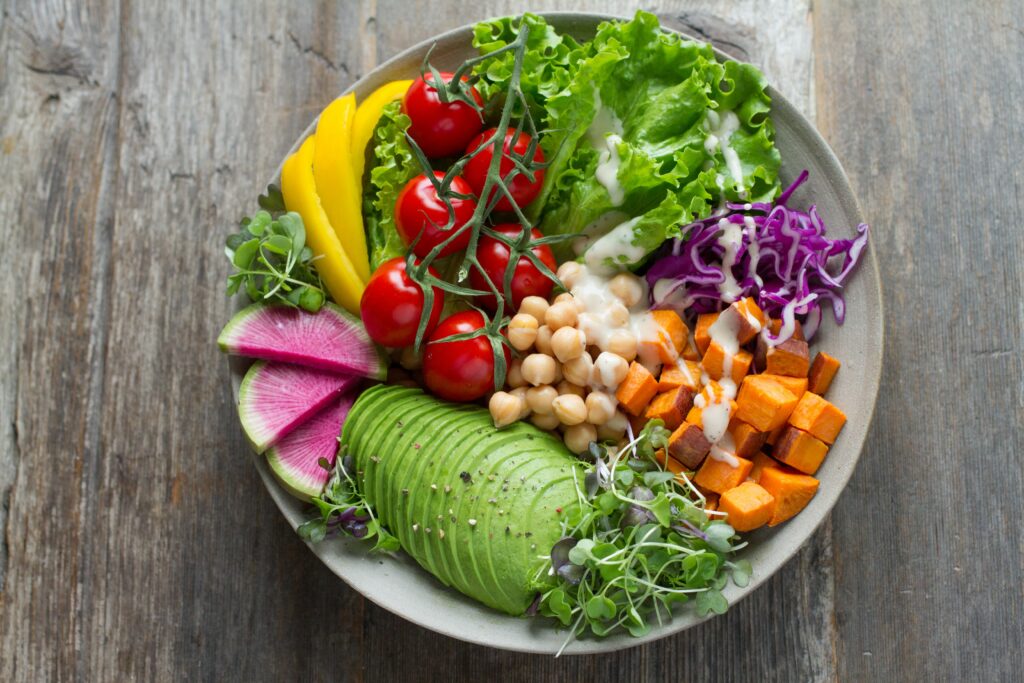Learning Objectives
➤ List general nutrition guidelines to follow.
➤ Describe ways to deal with changes in appetite.
➤ Identify important nutrients to include in a diet.
➤ Explain why staying hydrated is important.
3.3.1 Nutrition Guidelines
Nutrition plays a key role throughout your cancer treatment and beyond (Lymphedema Working Group, 2012). Not only does eating well give you more energy, but it also helps you cope with side effects during treatment and heal after treatment.
Although you can eat regular food right after surgery, your stomach might bother you (Boudarra et al., 2020). To prevent stomach problems, stick to clear foods, such as broth, apple juice, and water, during the first 24 hours after surgery. After 24 hours, incorporate light foods like toast and different soups. Continue this gradual incorporation process until you are back to your regular diet.
Constipation is a common side effect of some medications (e.g., narcotics), but eating fruits and vegetables, taking short walks, and drinking water are good strategies to prevent it (Boudarra et al., 2020).
3.3.2 Changes in Appetite
After your breast cancer treatment, your feelings towards food may be different than before your treatment (Lymphedema Working Group, 2012). For example, your anxiety about things in your life can make eating difficult, or you might lack any appetite. These feelings are completely normal. Fortunately, there are different strategies you can do to try to increase your appetite or make eating more enjoyable, including:
- having family members, friends, or others in your life eat meals with you,
- trying different foods to make meals more exciting and engaging,
- and playing music or turning on soft lighting to make the atmosphere of meals more pleasant (Lymphedema Working Group, 2012).
During this time, be patient with yourself. Remind yourself that these eating challenges are not permanent.
Once you feel more comfortable eating, try to make your meals balanced with fruits, vegetables, grains, and other foods that contain helpful nutrients (Lymphedema Working Group, 2012). Weight loss is a common side effect of breast cancer, so you may want to work with a dietician to figure out a diet that works best with your lifestyle, helps you maintain a healthy weight, and ensures you are getting enough nutrients.
Image 18: A vegan salad bowl

(Anna Pelzer / Unsplash)
Unsplash
3.3.3 Nutrients
Eating a variety of nutrients ensures that your body stays strong during and after breast cancer treatment (American Cancer Society, 2022c). Diets incorporating fats, proteins, carbohydrates, whole grains, and antioxidants are a good start.
Fats
Fats are important sources of energy that your body stores. There are various types of fats, including:
- Monosaturated — vegetable oils (e.g., olive, canola, and peanut).
- Saturated — animals (e.g., meat, poultry, and cheese) and some vegetable oils (e.g., coconut and palm).
- Polysaturated — vegetable oils (e.g., safflower, sunflower and corn) and seafood. (American Cancer Society, 2022c)
Proteins
Your body uses proteins to repair tissues, grow, and maintain your immune system (American Cancer Society, 2022c). This nutrients are important for healing during and after your breast cancer treatment.
Examples of protein include:
- eggs,
- lean meat,
- fish,
- poultry,
- dried beans,
- low-fat dairy products,
- and soy products (American Cancer Society, 2022c).
Carbohydrates
Like fats, carbohydrates are a source of energy; however, unlike fats, this energy is used for physical activities and keeping your organs functioning (American Cancer Society, 2022c).
Examples of good carbohydrates include:
- vegetables,
- fruits,
- and whole grains (American Cancer Society, 2022c).
Whole grains contain the natural nutrients in entire grain seeds (American Cancer Society, 2022c). Foods like bread, brown rice, quinoa, and cereals contain whole grains.
Carbohydrates are also good sources of fibre (American Cancer Society, 2022c). Your body uses fibre to remove unnecessary digested food waste and keep your stools soft, which prevents constipation.
Antioxidants
Antioxidants protect your cells during natural processes that occur in your body (American Cancer Society, 2022c).
Examples of antioxidants include:
- vitamin A, C, and E,
- selenium,
- and zinc (American Cancer Society, 2022c).
Fruits and vegetables are the best antioxidant sources, but you can also take supplements (American Cancer Society, 2022c). Talk to your healthcare team first before taking any supplements, though.
3.3.4 Hydration
Drinking water is critical for keeping your cells healthy and functioning properly (American Cancer Society, 2022c). Chemotherapy treatment can cause diarrhea and vomiting, which puts you at risk of dehydration. Ensuring that you are drinking enough fluids can help prevent said dehydration.
Although you should drink mostly water, other fluids like juices and sports drinks count towards staying hydrated (American Cancer Society, 2022c).